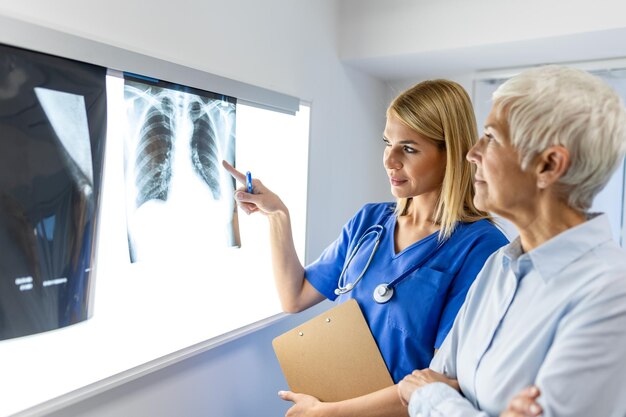Pulmonology Physician Assistant Career Guide | Education, Salary, and Career Outlook
The role of a Pulmonology Physician Assistant (PA) is one of great importance within the healthcare industry, particularly in the specialized field of pulmonology. These highly skilled medical professionals work alongside pulmonologists to diagnose and treat patients suffering from respiratory disorders. Whether tackling common ailments such as asthma, or managing complex conditions like chronic obstructive pulmonary disease (COPD) and lung cancer, Pulmonology PAs play a critical role in patient care and management.
Historically, the physician assistant profession emerged in the mid-20th century as a response to a shortage of primary care doctors. Since then, PAs have expanded their expertise into various specialties, including pulmonology, where their role is indispensable. The appeal of becoming a Pulmonology PA is multifaceted—offering a challenging yet rewarding career path for students who are passionate about making a significant difference in patients’ lives, while also enjoying continual opportunities for professional growth.
Education and Training
High School Preparation
A strong foundation in science and mathematics during high school is beneficial for aspiring Pulmonology PAs. Courses in biology, chemistry, and physics, along with advanced placement classes, can provide a solid background for further education in health sciences.
Required Degrees or Certifications
To become a Pulmonology PA, one must first become a certified physician assistant. This typically requires a bachelor's degree, followed by completing a Master’s program accredited by the Accreditation Review Commission on Education for the Physician Assistant (ARC-PA).
Specialized Training Programs
After earning a Master’s degree, PAs interested in specializing in pulmonology may pursue a post-graduate residency or fellowship in pulmonology or pulmonology-related settings. Such programs provide intensive training in pulmonary medicine, equipping PAs with the necessary expertise to excel in this specialty.
Licensing and Board Exams
All PAs must pass the Physician Assistant National Certifying Examination (PANCE) administered by the National Commission on Certification of Physician Assistants (NCCPA). For Pulmonology PAs, additional certification in a subspecialty may also be obtained through relevant fellowships and exams.
Continuing Education
Continuing medical education (CME) is crucial for maintaining certification and staying updated with the latest pulmonary advancements. Most PAs are required to complete 100 hours of CME every two years and must pass a recertification exam every ten years.
Summary of Education Pathway
| Education Step | Description |
|---|---|
| High School | Focus on science and math courses |
| Bachelor’s Degree | Majors like Health Science, Biology, or a related field are recommended |
| Master’s Degree in PA Studies | Accredited by ARC-PA |
| PANCE Certification | Required for practice |
| Specialized Fellowship/Residency | Optional, for pulmonology specialization |
| Continuing Medical Education | Ongoing requirement for certification maintenance |
Example Programs and Institutions
- Duke University Physician Assistant Program: Known for its comprehensive curriculum.
- Mayo Clinic School of Health Sciences: Offers a renowned PA fellowship in Pulmonary and Critical Care.
Skills and Qualities Needed
Hard Skills
- Medical Knowledge: Thorough understanding of pulmonary function and diseases.
- Diagnostic Skills: Ability to interpret various medical tests such as chest X-rays and lung biopsies.
- Clinical Procedures: Competence in procedures like bronchoscopy and thoracentesis.
Soft Skills
- Communication: Effective interaction with patients and healthcare teams.
- Problem-solving: Quick thinking in crisis situations, essential for patient care.
- Empathy and Compassion: Understanding patient concerns and providing emotional support.
Real-World Application
For instance, diagnosing a patient with COPD involves critical diagnostic skills to interpret spirometry results and tailor treatment plans. Similarly, communication skills are paramount while explaining complex medical conditions and treatment options to patients in an understandable manner.
Salary
U.S. National Averages
The salary for Pulmonology Physician Assistants varies based on factors such as experience, education, and geographic location. According to recent data, the average annual salary of a PA in the U.S. is approximately $115,000, with those in specialized fields such as pulmonology potentially earning more.
Salary Range by Career Stage
| Career Stage | Salary Range |
|---|---|
| Entry Level | $95,000 - $105,000 |
| Mid-Career | $110,000 - $125,000 |
| Experienced | $130,000 - $145,000 |
Factors Affecting Salary
- Location: High-demand areas may offer higher salaries.
- Education Level: Advanced degrees and certifications can lead to increased earnings.
- Specialization: PAs focusing on pulmonology often receive higher compensation than generalists.
Career Outlook and Job Help
Job Growth Data
The U.S. Bureau of Labor Statistics projects a growth rate of about 31% for physician assistants from 2019 to 2029, which is much faster than the average for all occupations. This growth is fueled by an increasing need for healthcare professionals who can provide specialized care.
Common Employment Settings
- Hospitals: Often working in pulmonary or respiratory departments.
- Specialty Clinics: Providing focused care in pulmonology practices.
- Research Facilities: Engaging in clinical research related to pulmonary health.
Career Advancement Opportunities
Pulmonology PAs can advance by obtaining additional certifications, engaging in medical research, or moving into administrative roles within healthcare institutions.
Tips for Job Seekers
- Resume Building: Highlight specialized training and clinical experiences.
- Networking: Attend pulmonary conferences and join professional organizations like the American Academy of Physician Assistants (AAPA).
- Certification Renewals: Keep up-to-date with certifications to remain competitive.
Final Insights
A career as a Pulmonology Physician Assistant is both rewarding and impactful. It offers unique opportunities to specialize in respiratory care, positively impacting patients’ lives by improving their quality of life and managing chronic conditions. Aspiring PAs are encouraged to pursue this path with dedication to education and professional development. With a combination of rigorous training and compassionate care, Pulmonology PAs hold the potential to shape the future of respiratory healthcare.
Embarking on this career path promises not only personal satisfaction but also a substantial contribution to advancing public health. Whether you're just starting out or looking to specialize, the role of a Pulmonology Physician Assistant is one of promise and fulfillment, characterized by continuous learning and the noble pursuit of healing.

